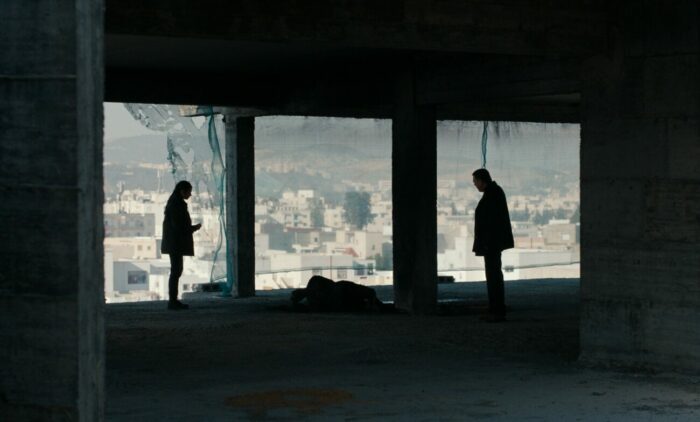Ashkal: The Tunisian Investigation burst onto my radar with no warning whatsoever. Up until a few days ago, I had never even heard of this movie, so when I received an email asking if I’d like to review it, I was caught completely by surprise. I knew nothing about this film, but the plot synopsis sounded interesting, and the trailer was pretty good. I decided to take a chance on it and request a screener, and after checking it out, I’m happy to report that I made the right call.
Ashkal: The Tunisian Investigation was directed by Youssef Chebbi, and it stars Fatma Oussaifi, Mohamed Houcine Grayaa, and Aymen Ben Hmida. It’s a supernatural police thriller set in Tunisia, and it follows two cops, Fatma and her partner Batal, as they investigate a series of burning deaths that may or may not be connected to a mysterious man with supernatural abilities.
When Fatma and Batal discover the first immolated corpse, it appears to be a suicide. However, the evidence doesn’t quite add up. People who know the guy say he would never kill himself, and they can’t figure out why he would choose such a politically charged death (if you’re not sure what I mean, just hold tight; we’ll talk about this in a little bit) rather than something more mundane, like hanging.
What’s more, the medical examiner reports that the man had no bruises on his body, and that’s particularly odd. As the woman notes, burning victims instinctively flail around in pain, so they usually bump into things. But this guy apparently stood still as he burned to death, so it looks like there’s more going on here than meets the eye.
It’s a really intriguing mystery, and as Ashkal: The Tunisian Investigation goes on, this mystery just grows deeper and deeper. For instance, the second body Fatma and Batal find also shows no evidence of bruising, and some witnesses who saw the immolation say that a man “gave her fire,” as if from his hand.

Again, it simply doesn’t add up, and for my money, this mystery is hands down the best thing about the movie. It kept me guessing from beginning to end, so my eyes were glued to the screen as the two main characters went about their investigation. I really wanted to know what was going on, and my interest in this story never waned for a single second.
That being said, I don’t want to give you the wrong idea. Ashkal: The Tunisian Investigation is a very slow burn, so don’t go into this film expecting a constant barrage of clues and new developments in Fatma and Batal’s case. The movie doesn’t work that way. Instead, it unfolds its mystery at a very deliberate (and, some might even say, painstaking) pace, so there are numerous times when the investigation seems to stand completely still for a fairly long while.
There are even a few stretches without any dialogue at all, so as great as this central mystery is, it can’t carry the entire film. In those slower moments, Ashkal: The Tunisian Investigation has to rely on its characters, atmosphere, and cinematography, and thankfully, those three elements are totally up to the task.
The characters are great, and the cinematography is beautiful, but for my money, the atmosphere is the best of the bunch. It’s not quite the pervasive feeling of dread we normally associate with atmospheric horror, but it’s just as effective. It’s a persistent sense that something isn’t quite right here, and it complements the mystery perfectly. In fact, it’s almost like the atmosphere extends that mystery beyond the times when it takes center stage, so it masterfully fills in the time between new developments in Fatma and Batal’s investigation.

That combination of a great mystery, excellent characters and cinematography, and a perfect atmosphere makes Ashkal: The Tunisian Investigation an absolute joy to watch from beginning to end, but that doesn’t mean it’s a perfect film. There’s not much to criticize about it, but there was one part I wasn’t exactly enamored with: the final scene.
I’m obviously not going to spoil anything, but I will say that it doesn’t give us the closure I expected. It resolves the mystery a little bit, but it still leaves a whole bunch of important questions unanswered. The movie is more interested in conveying its message than in wrapping up its story, and that makes for a less-than-satisfying finale on a narrative level.
On a thematic level, it’s tough for me to evaluate the ending of Ashkal: The Tunisian Investigation. It’s clearly commenting on the self-immolations that have taken place as political protests in the Arab world during the last decade or so, but I’m not sure exactly what its point is. It seems to take a negative stance toward this form of protest, but beyond that, I just don’t know enough about that part of the world to confidently say anything more concrete about the political resonances of this story.
However, even though Ashkal: The Tunisian Investigation doesn’t quite stick the landing, I still think it’s a hell of a good film. Everything that leads up to the ending is excellent, so I walked away with a pretty big smile on my face. In particular, the mystery and the atmosphere are enough to outweigh everything this movie does poorly, so if this sounds like something you’d enjoy, I highly recommend that you check it out.
Ashkal: The Tunisian Investigation is set to play in select theaters starting on August 18, and then it’ll hit digital platforms a few days later, on August 22.




